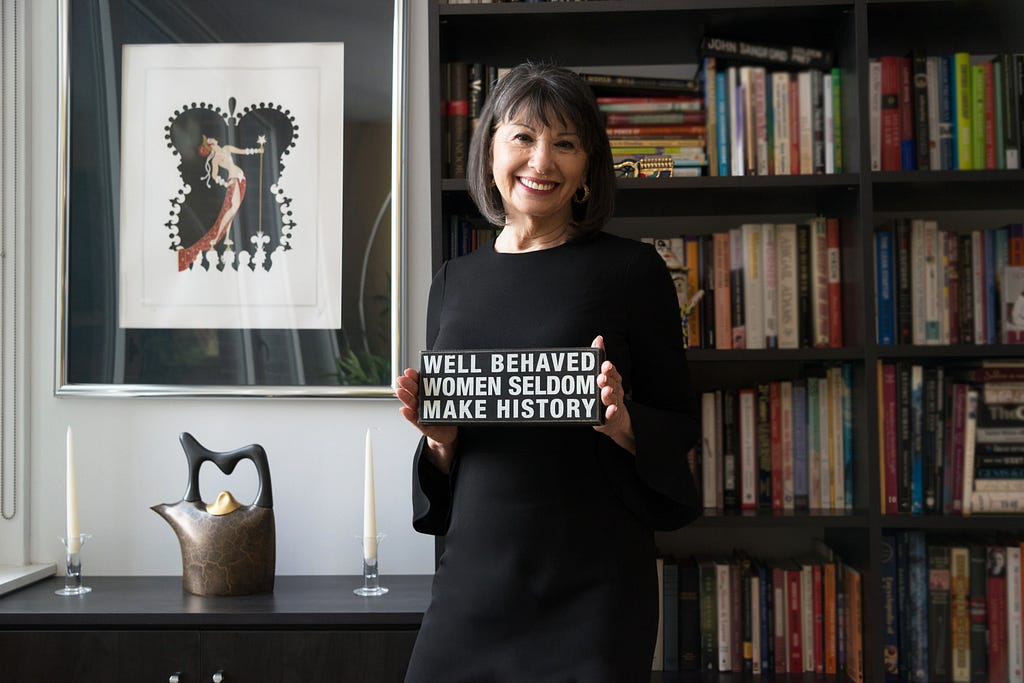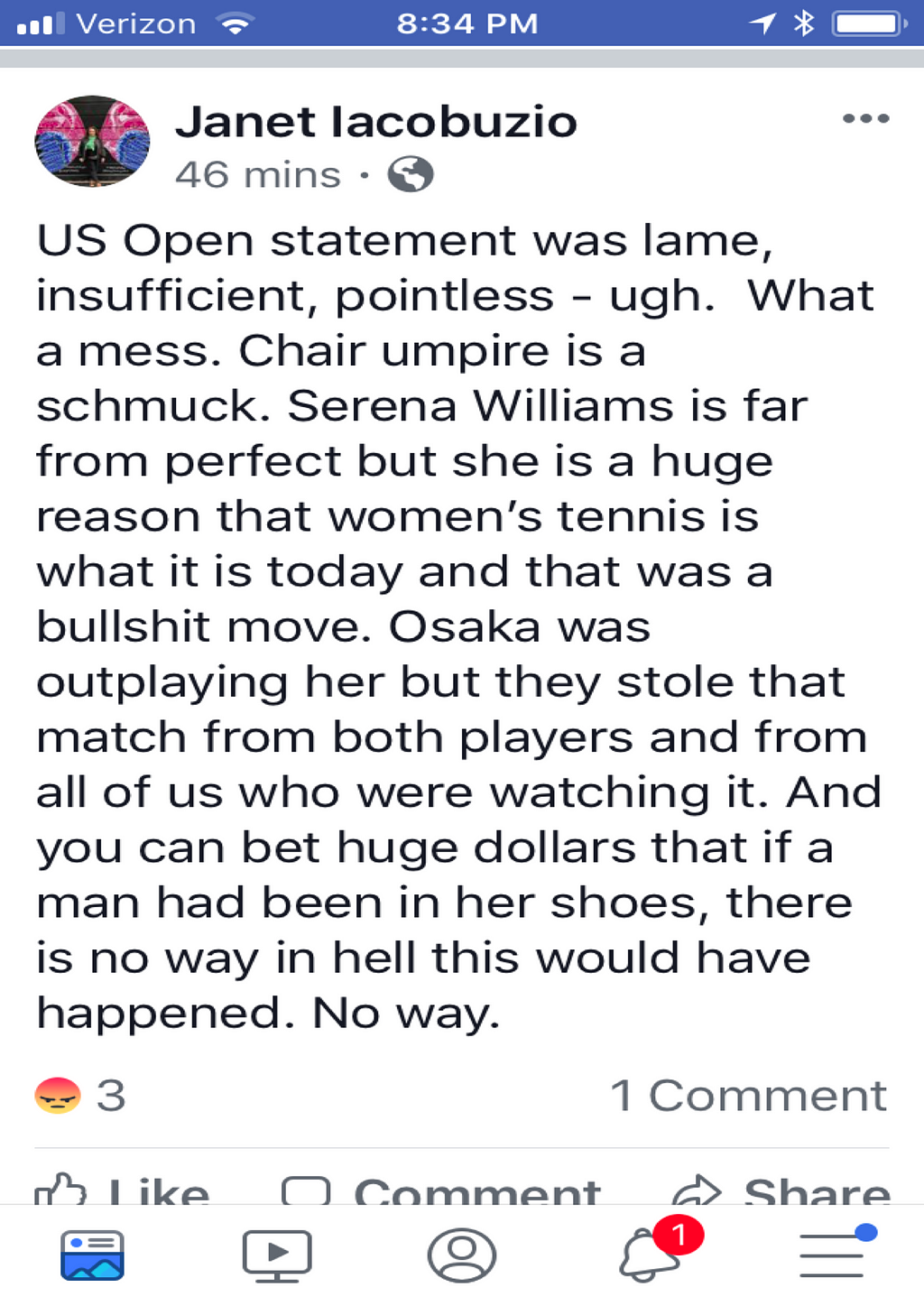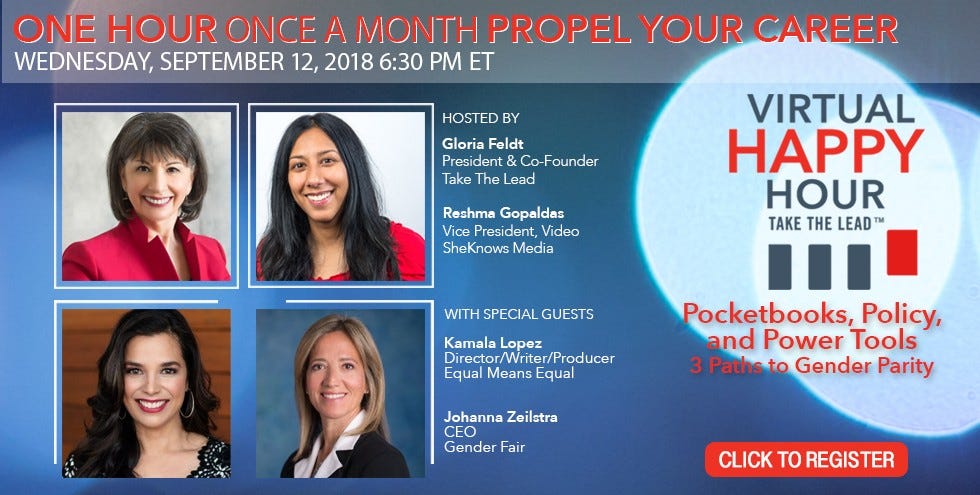Serena For President


Issue 65 — September 9, 2018
I’m not a tennis player. Want to know why? I’ll reveal that in a bit. Right now I am obsessed with Serena Williams for so many reasons.
First, it was the flap about her catsuit and then her tutu. But now, all things Serena have ratcheted up to the point that if anyone needs a lesson in implicit bias against women and people of color, here it is, staring them smack in the face.
Williams was fined $17,000 for an outburst at the U.S. Open, not unlike those male athletes have exhibited without penalty — and indeed are often even admired for. Because, after all, that’s the behavior we expect of men.
"You owe me an apology!"
— ESPN (@espn) September 8, 2018
Serena was fired up with the official in the final set of the US Open final. pic.twitter.com/r6RSbrirnV
How Things Look Different Depending on What Subtle Biases Shape Your Thinking
This article by Gillian White in The Atlantic (HT Leon Silver for sending it to me) lays it out perfectly, first acknowledging the U.S. Open victory over Williams by 20-year-old Naomi Osaka, then describing the kerfluffle between Williams and the chair umpire who penalized her first for receiving coaching, then for smashing a racket in frustration over the call, and third for “verbal abuse” after she called the umpire a thief:
Taking a game away from Williams for using the word “thief” during such a high-stakes match is unlikely to do much to quash the notion that a double standard exists between men and women in today’s competitive tennis field. And the stakes of that double standard can feel even higher for women of color. The support for Williams on Saturday — and throughout her career — comes not just from appreciation for her rare talent, but in part because some fans have an enduring memory of how difficult it is for women of color to make it in expensive, mostly white sports.
To see Williams’s comeback after a traumatic birth stymied over seemingly minor infractions seems unnecessary and malicious. To see the devastation that those penalties wrought on two women of color at the top of their sport, during what should have been a joyous time, is heartbreaking.
Outraged Responses
Women from trailblazing tennis great Billie Jean King as well as many men around the world both cheered Osaka’s victory and jeered the umpire for harsher treatment of Williams for behavior men exhibit frequently on the court with no notable consequences.
A short version of the outraged comments can be seen in this Facebook post by writer Janet Iacobuzio:

When I asked a friend whom I knew had been at the Open whether she had seen the actual game where this occurred, she replied that although she had watched that match on an airport television, her reaction was, “Serena for President.”
Understanding What Implicit Bias Does to Our Minds
Implicit or unconscious bias is overgeneralization about people and events that confirms previously held beliefs or culturally learned stereotypes. It’s why we often don’t know what we don’t know. Or as the saying goes, fish don’t see the water they swim in
We aren’t usually deliberately mis-defining others or discriminating against — or for — them. But what our brain does to help us organize thoughts and basically save time so we can get through the day without having to rethink every stimulus we receive also has the effect of closing out new ideas.
It’s like how building a wall to keep people out inherently also fences us in.
As I have observed implicit bias in action and have researched the topic for my 9 Leadership Power Tools courses, I have become increasingly aware of what being on the receiving end of toxic implicit bias over a sustained period of time does to our heads. I noticed that the pay gap between women and men is exactly the same — 20% — as the gap between how much the research finds women value their own work compared to other people’s work. So there seems to be a circular self-reinforcing process going on.
This brings me to why I stopped playing tennis at age 13, though I had been taking lessons for several years and enjoyed the sport. My family moved to a small town then. There was only one tennis court. It was at the public high school, and was situated where it was visible from the street. Shortly after my arrival, I recruited a girlfriend to play. Before we could finish our first set, a carload of boys drove by. And they drove by again and again, each time calling out the kind of sexist harassing comments that today would qualify for a #metoo.
I went home and never played again.
The tendency to be discouraged, put off, self-limiting as a result of experiencing bias might not always be that blatant, but that’s how it works on the brain nevertheless.
The Most Admirable Thing Serena Did
What makes me most admire Serena Williams is that she has trained her brain to reject that nonsense as surely as she has trained her body to become a champion athlete. She knows who she is and is not deterred from her intentions by anyone.
She is also clear about her sportsmanship, and was nothing but gracious to Osaka. That was #SisterCourage in action.
And she is clear about her values. She calls out sexism when she sees it and owns her responsibility as a celebrity and a woman to clear the path for other women. She is especially cognizant of the example she is setting for her own daughter. She didn’t win the Grand Slam on the tennis court this time, but she won in the court of public opinion big time, and with grace and courage.
Here’s what she said in a post-game interview: “I’m here to fight for women’s rights and women’s equality. The fact that I have to go through this is an example. Maybe it didn’t work out for me, but it’s going to work out for the next person.”
Serena for President. Who’s ready to join the campaign?
PS: To learn more about the 3 things that will enable women to get a fair shake on the tennis court and at work, join me and my guests for a rousing Virtual Happy Hour conversation.

GLORIA FELDTis the New York Times bestselling author of several books including No Excuses: 9 Ways Women Can Change How We Think About Power, a sought-after speaker and frequent contributor to major news outlets, and the Co-Founder and President of Take The Lead. People has called her “the voice of experience,” and among the many honors she has been given, Vanity Fair called her one of America’s “Top 200 Women Legends, Leaders, and Trailblazers,” and Glamour chose her as a “Woman of the Year.” As co-founder and president of Take The Lead, a leading women’s leadership nonprofit, her mission is to achieve gender parity by 2025 through innovative training programs, workshops, a groundbreaking 50 Women Can Change The World immersive, online courses, a free weekly newsletter, and events including a monthly Virtual Happy Hour program and a Take The Lead Day symposium that reached over 400,000 women globally in 2017.
